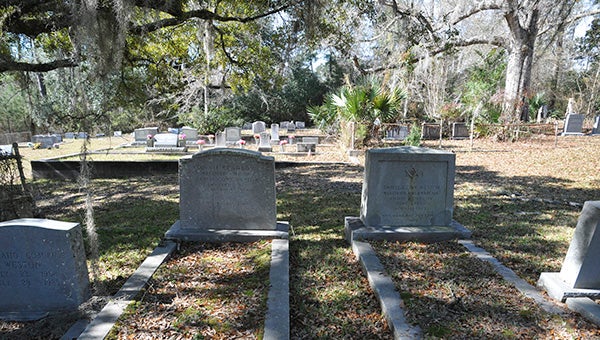Cemetery is all that’s left of Logtown
Published 7:00 am Friday, February 12, 2016

FORGOTTEN TOWN: All that remains from Logtown is a cemetery and historical marker. The residents were displaced with the construction of NASA’s John C. Stennis Space Center.
Photos by Cassandra Favre
In Hancock County all that remains of Logtown is a cemetery surrounded by 300-year-old oak and pine trees and gravesites of those residents who have passed.
During Wednesday’s meeting of the Pearl River County Historical Society, president Juanita Gex presented a history of the town that ceased to exist with the creation of the NASA John C. Stennis Space Center’s buffer zone in 1963.
Gex read from the book “Memories of Logtown.”
In May of 1961, Gex said, President John F. Kennedy announced that the Apollo Space program would have as its goal, the placement of a man on the moon. Five months later, on Oct. 25, 1961, NASA announced that the rocket testing facility for the project would be built in Hancock County, she said.
Robert Sharp wrote in his book, “As the space age opened, it devoured half of Hancock County,” Gex read.
“The towns of Santa Rosa, Napoleon, Logtown, Westonia, Gainesville and part of Bayou La Croix would be demolished and its citizens must relocate,” Gex said. “Within a year, some would go to Gulfport and others to New Orleans. Most went to Picayune, Pearlington, Slidell, Waveland or Bay St. Louis.”
Logtown was founded about 1815, Gex said. The town was home to the H. Weston Lumber Company, one of the largest exporting firms in the south, she said. The company operated two sawmills and employed 1,200 men at the peak of production, Gex said. The company had its own electric plant and ice factory and provided electricity to Logtown.
In the town, there were many businesses including, grocery, hardware and drug stores, ready-to-wear for men, women and children, silent movie theater, a Baptist and Methodist Church, a hotel called The Parkview and a park with a large swimming pool.
Gex added that Logtown families enjoyed hayrides, square dances and come-overs, which is a party where guests spent the night.
“There was a section for a display of coffins in Logtown,” Gex said. “The reason for this was that if somebody died, you had to have a coffin shipped from New Orleans and it took a lot of time, so they had coffins displayed in Logtown.”
The Logtown Post Office was in existence for nearly 90 years, Gex said. Lollie Wright was the postmaster for about 37 years, she added.
However, by 1960, Gex said the population of both Gainesville and Logtown had dwindled and had become “sleepy villages filled with old villas and picturesque gardens.”
The commerce in Logtown had been removed due to the closing of the sawmill and the opening of the New Orleans railway, Gex said. The remaining residents were happy to just live there, she added.
“In 1961, chaos and anger ensued,” Gex said. “The government froze the value of the lands and homes when they announced the acquisition, but outside of this area, the price of land shot up.”
Prior to the early 1960s, Logtown was virtually crime-free, Gex said. However, after NASA’s announcement, thieves began pillaging homes. News crews and government officials all descended upon Logtown as well.
“About 250 dissatisfied landowners staged a protest during this time,” Gex said. “They formed a committee and met at the Hancock County Courthouse. They put pressure, through the use of the media, and received concessions from the government, including reimbursement for location costs for the transport of the houses.”
Many homes were moved out of the towns and others were demolished, Gex said. Even the dead were moved, she added.
“It was very traumatic for so many of the families,” Gex said. “For some, the stress was too much.”
In 1963, Life Magazine printed photographs from Logtown. One showed an elderly Cora Davis riding on her porch as they moved her home from Gainesville to Picayune, Gex said.
“She had refused to leave her house, so she just rode with it,” Gex said. “Another picture showed Davis, the postmaster, closing the post office in Logtown. Less than 3,000 landowners were affected. NASA brought new opportunities both economic and educational to the area. They brought an increase in population and thousands of temporary and permanent jobs. Yet to many, this episode ruined the place they still described as a paradise.”
More News





